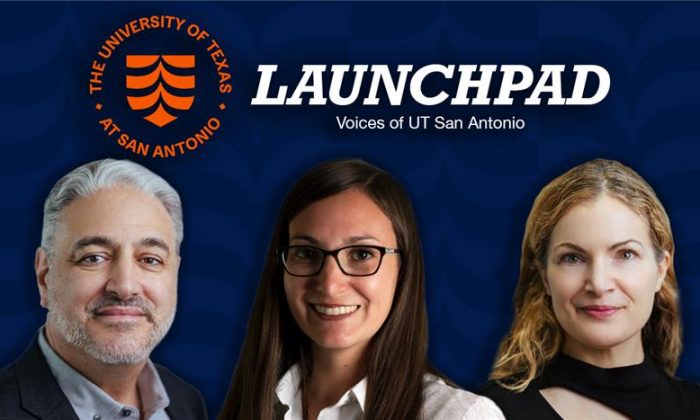OCTOBER 28, 2024 — UTSA was selected for a new grant that will foster a partnership with Bristol Myers Squibb (BMS), an industry leader in pharmaceutical development. The partnership will assist BMS with its work to discover new chemical reactions that will aid in the development of novel pharmaceutical manufacturing routes that are more efficient and better for the environment.
UTSA was awarded $615,000 in funding from the National Science Foundation (NSF) through its prestigious Grant Opportunities for Academic Liaison with Industry (GOALI) program. The award will fund the research through 2027.
The NSF created GOALI to provide supplemental funding that fosters collaborations between academic institutions and industry partners to accelerate new discoveries that would be challenging for either partner to achieve independently. GOALI awards undergo a rigorous review process and are highly competitive. This is the second GOALI award for UTSA.
“The broader impacts this funding will have on my students Department of Chemistry and the team at BMS cannot be overstated.”
Doug Frantz, the Max and Minnie Tomerlin Voelcker Endowed Chair of Chemistry and principal investigator on the project, will partner with BMS, one of the world’s largest pharmaceutical companies, on the award. Frantz has worked alongside BMS to publish several peer-reviewed articles over the past six years. One of their most recent publications went on to become one of last year’s most read articles in Organometallics, a leading journal in the field of organometallic chemistry.
“The highly successful collaboration my research group already has with BMS was the perfect opportunity to submit a GOALI proposal to the NSF to further catalyze our future success,” said Frantz.
The goal of this project is to discover and develop new catalysts that can control chemical reactivity in a class of compounds that are highly relevant to the pharmaceutical industry. BMS will utilize their high-throughput experimentation (HTE) capabilities that enable scientists to conduct thousands of reactions per week to identify new catalysts that can be refined in the Frantz Laboratory.
“BMS is excited to extend our partnership with Professor Frantz and his research group. The GOALI program will enable continuation and expansion of an already successful collaboration with a number of positive benefits for both the organizations and students involved in the research,” said Michael Hobbs, vice president of chemical process development.
Additionally, the program will provide a unique training environment for UTSA students in Frantz’s research group. They will have the opportunity to work directly with BMS scientists and gain professional career experience with a leading pharmaceutical firm.
“I am extremely grateful for this opportunity that Doug Frantz has provided for me to be a part of the collaboration with one of the biggest and well-known companies in the pharmaceutical industry,” said Nicolas Wilson, a graduate student on the Ph.D. track in chemistry who hopes to one day work in the pharmaceutical industry. “I am in constant communication with some of the brightest minds in industry which has, without a doubt, further deepened my knowledge and understanding of chemistry.”
Meredith Slimp, a UTSA junior majoring in chemistry, believes working on a project of this caliber is a dream opportunity for an undergraduate.
“Working with the Frantz group at UTSA, as well as the amazing team at Bristol Myers Squibb, is something that will leave me with profound experience and knowledge that will help me through graduate school, as well as my following career,” she added.
Frantz started his professional career in the pharmaceutical industry working as a process chemist to develop new and efficient chemical syntheses for small molecule drug candidates. This background provided him with an in-depth understanding of the issues process chemists face in the pharmaceutical industry and has allowed him to leverage his academic and industrial experience to assist with these challenges.
“The broader impacts this funding from the NSF will have on my students, the UTSA Department of Chemistry and the team of outstanding scientists at BMS cannot be overstated,” said Frantz. “This award from the NSF will support our ongoing and highly successful collaboration with BMS and catalyze new discoveries at the forefront of synthetic organic chemistry while also providing a unique experiential training program for undergraduate and graduate students here at UTSA.”



